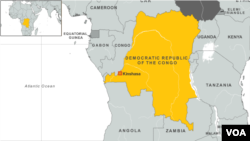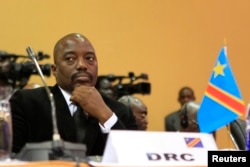Democratic Republic of Congo's richest and most powerful provincial governor is courting disaffected parties in President Joseph Kabila's coalition, fueling speculation he is preparing a 2016 electoral challenge, political sources say.
Moise Katumbi, the 50-year-old governor of copper-rich Katanga province in the southeast of the vast African nation, is also getting help from top Washington lobbyists pushing for an orderly vote in November next year, U.S. filings show.
Although Katumbi, owner of top flight Congolese soccer club TP Mazembe, was coy about his ambitions when contacted by Reuters, one source close to him said he would throw his hat into the ring as a presidential candidate in the next month.
"Moise will declare one year before the date scheduled for the start of the electoral campaign," the source, who spoke on condition of anonymity, said. The election campaign officially opens on Sept. 20 next year.
Kabila has ruled the former Belgian colony since his father's assassination in 2001, winning disputed elections in 2006 and 2011.
The constitution says he must quit next year but Kabila has refused to say whether he will leave office, angering opponents who accuse him of behaving like many African "Big Men" who cling to power beyond their mandate.
At least 40 people died in January in protests against revisions to the election code that demonstrators said were a pretext to delay the presidential vote.
However, analysts say a formal Katumbi bid with declared support from some of Kabila's partners could be sufficiently serious to force Kabila into the open.
"The most immediate effect would be a total remaking of Kabila's base," said Pascal Kambale, former Congo country director for the Open Society Initiative for Southern Africa. "If he reacts mildly it will be an indication that he is himself not interested to stay in power any longer than constitutionally needed."
A government spokesman has said that Kabila intends to respect the constitution.
With a large support base in Katanga and vast sums at his disposal, Katumbi is viewed by many analysts as the most credible successor to Kabila.
As a governor, Katumbi was credited with restoring infrastructure and supporting the booming mining sector, although critics accuse of him of lacking a long-term vision and using the office to advance his own business interests.
US lobbying
Katumbi's camp has also deployed a top law firm in Washington, Akin Gump Strauss Hauer & Feld LLP, to lobby for U.S. support for timely elections.
According to a July filing with the U.S. Department of Justice under the Foreign Agents Registration Act (FARA), Akin Gump contacted dozens of congressional staffers, non-governmental organizations and academics in the first six months of 2015 on behalf of the Mining Company of Katanga (MCK).
Katumbi co-founded MCK, which is now owned and controlled by his wife, Karyn, according to FARA records. Since 2011, the company has operated as a sub-contractor for mining companies, according to a filing with the provincial government.
It first retained Akin Gump in 2013, when the firm lobbied for the opening of a U.S. consulate in the Katanga capital, Lubumbashi, and a grain storage project.
But Akin Gump's 240 emails, phone calls and meetings in the first six months of this year on MCK's behalf all focused on "U.S. policy on 2016 DRC elections," according to the filing. Anthony Gambino, a Georgetown University lecturer and former U.S. Agency for International Development (USAID) director in Kinshasa, said he met an Akin Gump representative last week to discuss ways outsiders could press for Kabila's exit in 2016.
Gambino said Katumbi himself was not mentioned during discussions about Kabila's alleged efforts to stay in power.
Others contacted on behalf of MCK include the staff director of the House of Representatives Africa Sub-committee, the head of the National Democratic Institute (NDI) in Kinshasa and the senior DRC desk officer at the State Department.
Akin Gump policy adviser Roger Murry said the firm did not represent Katumbi's political interests but was "working in support of a more proactive U.S. role in promoting free, fair, transparent and timely presidential elections."
Domestic support
Katumbi, who has made millions through his mining and other business interests, was elected governor of Katanga in 2006 with Kabila's support.
But the relationship soured after Katumbi used a public rally in December to urge his supporters to challenge Kabila's right to score a "third penalty" against Congo, a thinly veiled reference to a third term by the president.
Katumbi is also losing his post as governor after Katanga, home to the continent's top copper production, was divided into four regions as part of a decentralization drive widely interpreted as an attempt to weaken Katumbi.
In response, he is building nationwide support, sources say.
"I'm telling you that the man is working," the source close to Katumbi said. "He's even planning to launch a satellite television channel very soon to reach the entire republic."
He has also won backing from the so-called 'G7' — seven parties in the ruling coalition critical of Kabila's refusal to declare his intentions, one G7 leader told Reuters.
"We will support Katumbi publicly once he announces," the party leader said. "We didn't sign on to support Kabila after 2016."






